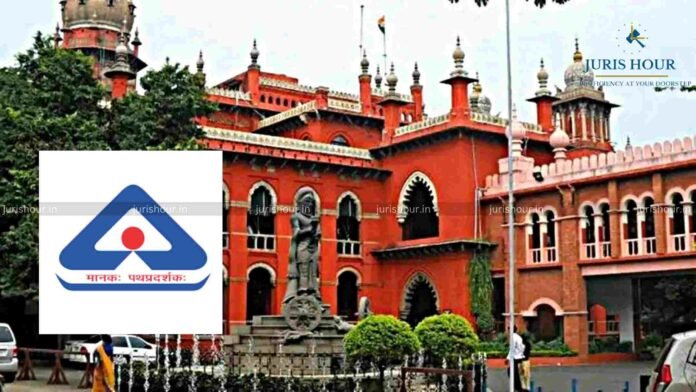The Madras High Court has directed Customs authorities at Chennai Port to clear a consignment of imported plywood belonging to M/s Alankar Shipping and Trading Co. Pvt. Ltd.—a registered MSME—without insisting on a Bureau of Indian Standards (BIS) registration certificate, ruling that the statutory exemption granted to micro enterprises applies equally to importers under the BIS Act, 2016.
The bench of Justice N. Anand Venkatesh held that the relaxation provided under the Plywood and Wooden Flush Door Shutters (Quality Control) Order, 2024—which deferred the requirement of mandatory BIS certification for micro enterprises until August 28, 2025—cannot be denied to MSME importers. The Court emphasized that the BIS Act, 2016 makes no distinction between domestic producers and importers.
The petitioner, Alankar Shipping and Trading, a Chennai-based micro enterprise registered under the MSME classification, imported 3,456 sheets of packing plywood from Vietnam valued at USD 24,896.96. The consignment landed in Chennai on August 13, 2025, under a Bill of Entry dated August 12, 2025. Customs authorities, however, refused to clear the goods, citing the absence of a BIS registration certificate.
The petitioner argued that, as a micro enterprise, it was entitled to the exemption from BIS compliance until the notified date and had sought permission to warehouse the goods under Section 49 of the Customs Act, 1962—an application that was denied by the department.
The Customs Department relied on a March 19, 2025 circular issued by the Ministry of Commerce and Industry to the Central Board of Indirect Taxes and Customs (CBIC), which stated that the additional time period allowed to micro and small enterprises under Quality Control Orders “does not apply to imports.” The Ministry clarified that only BIS-marked products or those with explicit exemptions from the Department for Promotion of Industry and Internal Trade (DPIIT) could be imported after the implementation date.
Rejecting the government’s stand, Justice Venkatesh ruled that such administrative circulars cannot override or restrict statutory provisions.
“When the enactment does not distinguish between an importer and a person who does domestic production, the circular cannot be pressed into service to create such a distinction,” the Court observed.
The judge pointed out that Sections 16 and 17 of the BIS Act, 2016 impose uniform obligations on all “persons,” including importers and manufacturers, to comply with standard mark requirements. Therefore, exemptions and relaxations granted to MSMEs under the Quality Control framework must apply equally to importers.
“A circular cannot traverse beyond the scope of the enactment which governs the field,” the order stated, declaring that the Ministry’s clarification was inconsistent with the BIS Act.
The Court directed the Customs Department to assess and clear the goods within two weeks without insisting on a BIS certificate and disposed of the writ petition with no order as to costs.
Case Details
Case Title: M/s.Alankar Shipping and Trading Co. P. Ltd Versus The Commissioner of Customs Import Commissionerate
Case No.: WP No. 34907 of 2025
Date: 25/09/2025
Counsel For Petitioner: G.Derrick Sam
Counsel For Respondent: J.Vasu
Read More: FM Sitharaman Launches Forex Currency Settlement System, Calls For Responsible AI-driven Fintech

